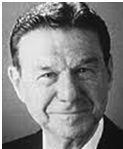|
 |
|
 |
|
|
||
Armand Feigenbaum (1922-2014)
American quality expert (pictured right) Creator of the term “total quality control”, discussed further by the Japanese professor, Kaoru Ishikawa (pictured right below)
Key book
Total Quality Control (1951) Total quality control is a co-ordinated, organization-wide quality effort to achieve total customer satisfaction through product reliability, serviceability , safety and attractiveness. (see below in key quotes for Feigenbaum’s full definition).
So you must believe that quality is:
1. Everyone’s business Every employee must:
2. Philosophy Quality is a belief that must be shared by everybody.
3. Empowerment Employees must take responsibility for quality.
4. A cost As much as 40% of a factory’s production capacity can be wasted by mistakes caused by not getting it right first time. This potential extra capacity is “hidden plant”.
5. Customer driven Quality is what the customer says it is. Everything that the organization does must be seen from the customer’s point of view.
6. Teamwork Quality requires effective co-operation between employees in different functions like production and marketing.
7. Innovation Creative solutions must be found to quality problems.
8. Continuous Total quality control isn’t a temporary, quick fix solution.
9. Stakeholder partnerships Suppliers and customers must be involved.
10. Leadership Total quality control needs knowledgeable and inspiring managers to put it into action.
11. Efficiency Quality increases productivity by reducing defects and so increasing saleable products.
12. Design Total quality control will lead to improved product design.
Key quotes on quality (from the revised 3rd edtion,1991) Quality is what the customer - not the company - says it is. Total quality control is an effective system for integrating the quality development, quality maintenance, and quality improvement efforts of the various groups in an organization so as to enable marketing, engineering, production and service at the most economical levels which allow full customer satisfaction. It is quality as well as price that sells today and quality that brings customers back for the second, third and fifteenth time. |
|
|
||
|
|
||
| Copyright © wisdomtowin.com 2025 All Rights Reserved | ||
|




